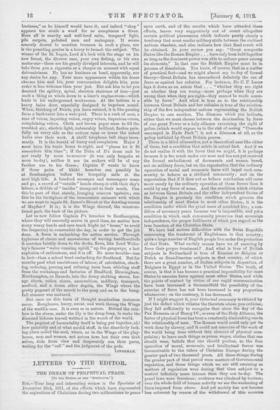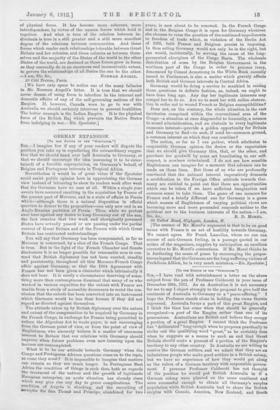LETTERS TO THE EDITOR.
THE DREAM OF PERPETUAL PEACE.
[To Tun EDITOR Or THE " SPEOTATOR."]
Sin,—Your long and interesting review in the Spectator of December 23rd, 1911, of the efforts which have represented the aspirations of Christians during two millenniums to peace upon earth, and of the results which have attended these efforts, leaves very suggestively out of count altogether certain political phenomena which indicate pretty clearly a tendency that must render military strife between the civilized nations obsolete, and also indicate how that final result will be obtained. In your review you say : " Great composite States like the Roman Empire . . . have only been held together so long as the dominant power was able to enforce peace among its elements." In that case the British Empire must be in process of dissolution. You know, of course, that as a matter of practical fact—and we might almost say to-day of formal theory—Great Britain has surrendered definitely the use of force as against her colonies. For instance, Sir C. P. Lucas lays it down as an axiom that . . . "whether they are right or whether they are wrong—more perhaps when they are wrong than when they are right—they cannot be made amen- able by force." And what is true as to the relationship between Great Britain and her colonies is true of the relation- ship of the five independent nations representing the British Empire to one another. The dilemma which you indicate, either that we must choose between the domination by force of one great Power or a holy alliance exercising the riglit of police (which would expose us to the risk of seeing "Cossacks encamped in Hyde Park ") is not a dilemma at all, as the policy initiated by Great Britain proves.
There is a third alternative, not a theoretical case like either of these, but a condition that exists in actual fact. And if we do not realize it with the force that we might, it is perhaps because it is too much under our nose and has not yet received the formal embodiment of documents and names, based, not on military force, but on the expectation that the ordinary operation of social and economic force will impel each com- munity to behave as a civilized community ; and on the expectation that if it does not so behave retribution will come more surely by the ordinary operation of those forces than it could by any force of arms. And the condition which obtains as between Great Britain and the other independent States of the Empire is precisely the condition which governs the relationship of most States to most other States ; it is the condition under which the great mass of mankind live ; a con- dition of necessary peace because war is impossible, and yet a condition in which each community preserves that sovereign independence, the proper fulfilment of which you regard as the true function of the Christian State.
We have had serious difficulties with the Swiss Republic concerning the treatment of Englishmen in that country ; quite a large number of English people live under the protection of that State. What earthly means have we of assuring by force their proper treatment P And what is true of British subjects in Switzerland is true of Russian or Belgian or Dutch or Scandinavian subjects in that country, of which there are a great number, of Italian subjects in Argentina, of Belgians in Egypt or in the United States. The truth, of course, is that it has become a practical impossibility for most States to exercise force against most other States, and while the points of contact by virtue of our rapid communication have been increased a thousandfold the possibility of the exercise of force has not been increased in any proportion whatsoever; on the contrary, it has decreased.
If I might suggest it, your historical summary is vitiated by just the defect which vitiates the theorists whom you criticise; they fail sufficiently to recognize that since the day of the Pax Romano, or of Henry IV., or even of the Holy Alliance, the factor of physical force has been a constantly diminishing one in the relationship of men. The Roman world could only get its work done by slavery, and it could not conceive of the work of the world being done without this element of physical com- pulsion; to leave such things as prices, wages, clothes that one should wear, beliefs that one should profess, to the free operation of moral, economic, and intellectual forces was inconceivable to the rulers of Christian Europe during the greater part of two thousand years. All these things during the greater part of that period were matters of Governmental regulation, and those things which we are still retaining as matters of regulation were during that time subject to a control infinitely more intense than they are to-day. The penal laws were ferocious ; evidence was obtained by torture; over the whole field of human activity we see the weakening of force imposed from above. And yet society has not become less coherent by reason of the withdrawal of this exercise
of physical force. It has become more coherent, more interdependent, by virtue of the unseen forces which hold it together. And what is true of the relation between in- dividuals is true in a still greater and a still more manifest degree of the relations between communities. And those forces which render such relationships tolerable between Great Britain and her colonies, and those colonies as between them- selves and the majority of the States of the world to the other States of the world, are destined as those forces grow in force, as they assuredly do to an enormous and inconceivable extent, to govern the relationships of all States the one to the other.
[We have only space to notice one of the many fallacies in Mr. Norman Angell's letter. It is true that we should never dream. of using force to interfere in the internal and domestic affairs of any of the self-governing nations of the Empire. If, however, Canada were to go to war with Australia we should certainly intervene to prevent hostilities. The better example is the Indian Empire. It is the physical force of the British Raj which prevents the Native States from indulging in war.—En. Spectator.]



















































 Previous page
Previous page